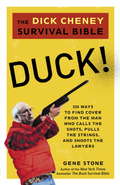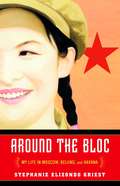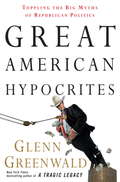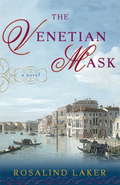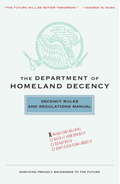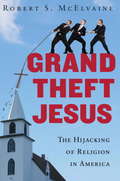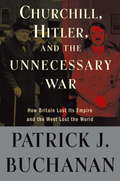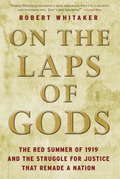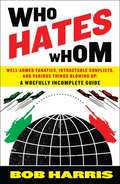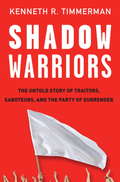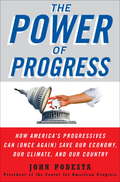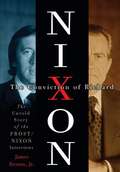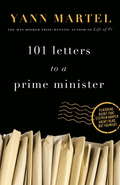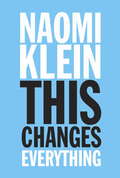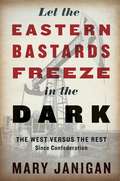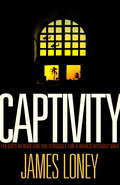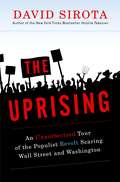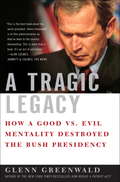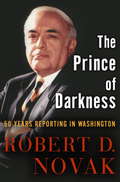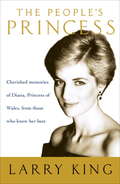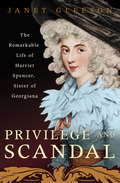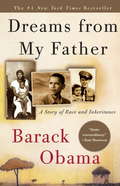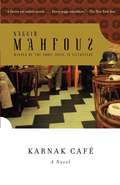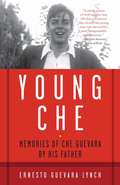- Table View
- List View
Duck!
by Gene StoneWhether you like it or not, Dick Cheney is our president. Whoops, we mean vice president. Now, just in time for hunting season, here's an indispensable guide fully loaded with tips for surviving these tortuous Cheney years, including: 6 actions to take if you think someone is spying on you; 4 recipes for cooking quail; 4 public relations steps to take if you've shot someo 9 things Halliburton is under investigation f 6 ways to impeach a vice president; 7 things to do if your children exhibit Cheney-like behavior (other than send them hunting with the vice president); and 9 ways to profit financially from Cheney. So take heart that we're in the last throes, if you will, of the Cheney reign. Remember, the best kind of leader by far is a lame duck!
Around the Bloc: My Life in Moscow, Beijing, and Havana
by Stephanie Elizondo GriestDesperate to escape South Texas, Stephanie Elizondo Griest dreamed of becoming a foreign correspondent. So she headed to Russia looking for some excitement-- commencing what would become a four-year, twelve-nation Communist bloc tour that shattered her preconceived notions of the "Evil Empire." In Around the Bloc, Griest relates her experiences as a volunteer at a children's shelter in Moscow, a propaganda polisher at the office of the Chinese Communist Party's English-language mouthpiece in Beijing, and a belly dancer among the rumba queens of Havana. She falls in love with an ex-soldier who narrowly avoided radiation cleanup duties at Chernobyl, hangs out with Cuban hip-hop artists, and comes to difficult realizations about the meaning of democracy.
Great American Hypocrites: Toppling the Big Myths of Republican Politics
by Glenn GreenwaldSURGEON GENERAL'S WARNING: Falling for the Marlboro Man marketing and sleazy takedown tactics of the Republican Party can be hazardous to the health of this nation! Ever since the cowboy image of Ronald Reagan was sold to Americans, the Republican Party has used the same John Wayne imagery to support its candidates and take elections. We all know how they govern, but the right-wing propaganda machine is very adept at hijacking debate and marketing their candidates as effectively as the Marlboro Man. For example: Myth: The Republican nominee is an upstanding, regular guy who shares the values of the common man. Reality: He divorced his first wife in order to marry a young multimillionaire heiress whose family then funded his political career. Myth: Republicans are strong on defense and will keep us safe. Reality: They prey on fears, and their endless wars make America far less secure. Myth: Republicans are the party of fiscal restraint and small, limited government. Reality: Soaring deficits, unchecked presidential power, and an increasingly invasive surveillance state are par for their course. "Intelligent, insightful. " --Daily Kos "Glenn Greenwald has done it again. " --Alan Colmes "Glenn Greenwald is a treasure. " --BuzzFlash
The Venetian Mask: A Novel
by Rosalind LakerEnduring friendships and long-held vendettas come alive against the splendor and decadence of eighteenth-century Venice.In 1775 Venice–known to outsiders as “the brothel of Europe”–the tradition of mask-wearing has allowed adultery and debauchery to flourish. But Marietta and Elena, two dear friends at the Ospedale della Pietà, a world-famous orphanage and music school for girls, know little of that milieu–until they come of age. Elena is forced to wed the head of the Celano clan, a jealous, brutal man, while Marietta marries Domenico Torrisi, whose family vendetta with the Celanos is centuries old. Tradition dictates that the friends should never speak again, but their bond is too strong to break. As the French Revolution unsettles all of Europe, Elena’s husband frames Domenico and he becomes a political prisoner. Marietta and Elena plot to save him, and the women discover that Venetian masks have noble purposes, too–but will their efforts put their own lives at risk?Embodying the glitter and the treachery of the city it portrays, The Venetian Mask will keep you turning pages long into the night.From the Trade Paperback edition.
The Department of Homeland Decency
by Susan Fuller Frank FullerLooking back at history, Americans have begun to realize that things were a lot better a long time ago. Men worked all day, raised large families, and didn’t expect others to pay for their health care. Their wives stayed at home and cooked, cleaned, and made themselves look pretty, just as our gracious Creator intended. The children of these decent parents did what they were told, spoke only when spoken to, and didn’t pierce their body parts. They understood it was thier parents’ right and obligation to administer spankings. Well, praise the government: Decency is back! The USA DECENCY ACT was passed this year by an overwhelming majority. Its basic tenets seek to bring us back to a world where: •Men are men •Women are women •Men and women are certainly not descended from apes •Lunch is not free •Nudity belongs at home. . . in the bedroom. . . in the dark By abiding by the rules in this manual, the Department of Homeland Decency will soon have everyone marching proudly backwards to the future! *This manual has been reviewed and approved for general distribution by an unqualified political appointee. As there never seems to be enough time to root out and document the seemingly endless variety of the inappropriate and the profane, we invite you to report any indecent behaviors we may have neglected to legislate to the appropriate authorities, namely us. Do not discuss your comments with others before submitting them to our official address, which, for reasons of national security, we are unable to publish in this document or any government directory or website. For now all such commentary may be submitted to www. homelanddecency. com, where comments will be processed and forwarded to our secure database. We apologize for our illusiveness. All communications with us, once submitted, should be promptly forgotten. If you need to refer to previous communications with our offices, please don’t. All communications become the property of the Department and cannot be returned or acknowledged in any way. In fact we reserve the right to deny receiving them at all, unless they contain material of a salacious or improper nature. In which case, they will be forwarded to our research and prosecution division where your name and your remarks will be entered into our database and cross-referenced with all other questionable statements made throughout history. From the Trade Paperback edition.
Grand Theft Jesus: The Hijacking of Religion in America
by Robert S. McelvainePromising that he will not hesitate to call a spade a spade, McElvaine (history, Millsaps College, Mississippi) gathers into one lively volume accounts of the greed, corruption, scriptural distortion, political opportunism, and other sins committed by people in the US today not only pretending to be Christians but also claiming to speak for Jesus himself. The easy road to heaven, biblical inerrancy once Jesus is purged, unintelligent design, and blaming women are among his areas of investigation. Annotation ©2008 Book News, Inc. , Portland, OR (booknews. com)
Churchill, Hitler, and "The Unnecessary War": How Britain Lost Its Empire and the West Lost the World
by Patrick J. BuchananWere World Wars I and II--which can now be seen as a thirty-year paroxysm of slaughter and destruction--inevitable? Were they necessary wars? Were the bloodiest and most devastating conflicts ever suffered by mankind fated by forces beyond men's control? Or were they products of calamitous failures of judgment? In this monumental and provocative history, Patrick Buchanan makes the case that, if not for the blunders of British statesmen--Winston Churchill first among them--the horrors of two world wars and the Holocaust might have been avoided and the British Empire might never have collapsed into ruins. Half a century of murderous oppression of scores of millions under the iron boot of Communist tyranny might never have happened, and Europe's central role in world affairs might have been sustained for many generations.Among the British and Churchillian blunders were:* The secret decision of a tiny cabal in the inner Cabinet in 1906 to take Britain straight to war against Germany, should she invade France* The vengeful Treaty of Versailles that muti- lated Germany, leaving her bitter, betrayed, and receptive to the appeal of Adolf Hitler* Britain's capitulation, at Churchill's urging, to American pressure to sever the Anglo- Japanese alliance, insulting and isolating Japan, pushing her onto the path of militarism and conquest* The 1935 sanctions that drove Italy straight into the Axis with Hitler* The greatest blunder in British history: the unsolicited war guarantee to Poland of March 1939--that guaranteed the Second World War* Churchill's astonishing blindness to Stalin's true ambitions. Certain to create controversy and spirited argument, Churchill, Hitler, and "The Unnecessary War" is a grand and bold insight into the historic failures of judgment that ended centuries of European rule and guaranteed a future no one who lived in that vanished world could ever have envisioned.From the Hardcover edition.
On the Laps of Gods: The Red Summer of 1919 and the Struggle for Justice That Remade a Nation
by Robert WhitakerThey shot them down like rabbits . . . September 30, 1919. The United States teetered on the edge of a racial civil war. During the previous three months, racial fighting had erupted in twenty-five cities. And deep in the Arkansas Delta, black sharecroppers were meeting in a humble wooden church, forming a union and making plans to sue their white landowners, who for years had cheated them out of their fair share of the cotton crop. A car pulled up outside the church . . . What happened next has long been shrouded in controversy. In this heartbreaking but ultimately triumphant story of courage and will, journalist Robert Whitaker carefully documents--and exposes--one of the worst racial massacres in American history. Over the course of several days, posses and federal troops gunned down more than one hundred men, women, and children. But that is just the beginning of this astonishing story. White authorities also arrested more than three hundred black farmers, and in trials that lasted only a few hours, all-white juries sentenced twelve of the union leaders to die in the electric chair. One of the juries returned a death verdict after two minutes of deliberation. All hope seemed lost, and then an extraordinary lawyer from Little Rock stepped forward: Scipio Africanus Jones. Jones, who'd been born a slave, joined forces with the NAACP to mount an appeal in which he argued that his clients' constitutional rights to a fair trial had been violated. Never before had the U. S. Supreme Court set aside a criminal verdict in a state court because the proceedings had been unfair, so the state of Arkansas, confident of victory, had a carpenter build coffins for the men. We all know the names of the many legendary heroes that emerged from the civil rights movement: Thurgood Marshall, Rosa Parks, and Martin Luther King Jr. among them. Whitaker's important book commemorates a legal struggle, Moore v. Dempsey, that paved the way for that later remaking of our country, and tells too of a man, Scipio Africanus Jones, whose name surely deserves to be known by all Americans.
Who Hates Whom: Well-Armed Fanatics, Intractable Conflicts, and Various Things Blowing Up A Woefully Incomplete Guide
by Bob HarrisThe daily news gives you events but rarely context. So what do al-Qaeda, North Korea, and Iran really want? Which faction is which in Iraq and who's arming whom? What's the deal with Somalia, Darfur, and Kashmir? Fatah, Hamas, and Hezbollah?Finally, here's Who Hates Whom--a handy, often stunning guide to the world's recent conflicts, from the large and important to the completely absurd.* Which countries are fighting over an uninhabitable glacier with no real strategic value--at an annual cost of half a billion dollars?* Which underreported war has been the deadliest since World War II--worse even than Vietnam--with a continuing aftermath worse than most current conflicts combined?* Which royal family members were respected as gods--until the crown prince machine-gunned the king and queen?* Which country's high school students think the Nazis had a "good side"? Which nation's readers recently put Mein Kampf on the bestseller list? And which other country watches itself with four million security cameras? (Hint: All three are U.S. allies.) Detailed with more than fifty original maps, photographs, and illustrations, Who Hates Whom summarizes more than thirty global hotspots with concise essays, eye-catching diagrams, and (where possible) glimmers of kindness and hope.In which bodies of water can you find most of the world's active pirates? Which dictatorship is bulldozing its own villages? Where exactly are Waziristan, Bangsamoro, Kurdistan, Ituri, Baluchistan, and Jubaland--and how will they affect your life and security? Find out in Who Hates Whom, a seriously amusing look at global humanity--and the lack thereof.From the Trade Paperback edition.
Shadow Warriors: The Untold Story of Traitors, Saboteurs, and the Party of Surrender
by Kenneth R. TimmermanTimmerman contends that partisan bureaucrats at the State Department, the CIA, and other key agencies, together with Democratic politicians, are actively undermining the Bush administration policy at every turn, thus gutting America's ability to fight the War on Terror.
The Power of Progress
by John PodestaThe Center for American Progress, an influential liberal think tank, offers fresh ideas and a bold new vision for Americans who are hungry for change and demanding answers to questions concerning terrorism, the conflict in Iraq, rising health-care costs, and other pertinent issues.
The Conviction of Richard Nixon
by James Reston Jr.While Richard Nixon avoided conviction on impeachment charges by resigning from the White House, the 1977 televised interviews conducted with Nixon by David Frost convicted Nixon as a political pariah in the minds of many viewers. The author of this book served as the Watergate advisor to Frost for the interviews and here recounts his insider's view of the interviews. The text was written contemporaneously but is being published now for the first time. Annotation ©2008 Book News, Inc. , Portland, OR (booknews. com)
101 Letters to a Prime Minister
by Yann MartelFrom the mailbox of the Prime Minister's Office to your bookshelf, a list of more than 100 books that every Canadian should read. This largely one-sided correspondence from the "loneliest book club in the world" is a compendium for bibliophiles and those who follow the Canadian political scene. Smart, subversive, signed, sealed, and now available to you...even if your address is not 80 Wellington Street.
This Changes Everything: Capitalism vs. The Climate
by Naomi KleinThe most important book yet from the author of the international bestseller The Shock Doctrine, a brilliant explanation of why the climate crisis challenges us to abandon the core “free market” ideology of our time, restructure the global economy, and remake our political systems.<P> In short, either we embrace radical change ourselves or radical changes will be visited upon our physical world. The status quo is no longer an option.<P> In This Changes Everything Naomi Klein argues that climate change isn’t just another issue to be neatly filed between taxes and health care. It’s an alarm that calls us to fix an economic system that is already failing us in many ways. Klein meticulously builds the case for how massively reducing our greenhouse emissions is our best chance to simultaneously reduce gaping inequalities, re-imagine our broken democracies, and rebuild our gutted local economies. She exposes the ideological desperation of the climate-change deniers, the messianic delusions of the would-be geoengineers, and the tragic defeatism of too many mainstream green initiatives. And she demonstrates precisely why the market has not—and cannot—fix the climate crisis but will instead make things worse, with ever more extreme and ecologically damaging extraction methods, accompanied by rampant disaster capitalism.<P> Klein argues that the changes to our relationship with nature and one another that are required to respond to the climate crisis humanely should not be viewed as grim penance, but rather as a kind of gift—a catalyst to transform broken economic and cultural priorities and to heal long-festering historical wounds. And she documents the inspiring movements that have already begun this process: communities that are not just refusing to be sites of further fossil fuel extraction but are building the next, regeneration-based economies right now.<P> Can we pull off these changes in time? Nothing is certain. Nothing except that climate change changes everything. And for a very brief time, the nature of that change is still up to us.
Let the Eastern Bastards Freeze in the Dark: The West Versus the Rest Since Confederation
by Mary JaniganThe oil sands. Global warming. The National Energy Program. Though these seem like modern Canadian subjects, author Mary Janigan reveals them to be a legacy of longstanding regional rivalry. Something of a "Third Solitude" since entering Confederation, the West has long been overshadowed by Canada's other great national debate: but as the conflict over natural resources and their effect on climate change heats up, 150 years of antipathy are coming to a head. Janigan takes readers back to a pivotal moment in 1918, when Canada's western premiers descended on Ottawa determined to control their own future--and as Margaret MacMillan did in Paris 1919, she deftly illustrates how the results reverberate to this day.
Captivity: 118 Days in Iraq and the Struggle for a World without War
by James LoneyThe powerful account of the remarkable peace activist kidnapped while leading a peace delegation and held for ransom by Iraqi insurgents until his paradoxical release by a crack unit of special forces commandos.In November 2005, James Loney and three other men -- Canadian Harmeet Singh Sooden, British citizen Norman Kember and American Tom Fox -- were taken hostage at gunpoint. The men were with Christian Peacemaker Teams (CPT), an organization that places teams trained in non-violent intervention into lethal conflict zones. The then unknown Swords of Righteousness Brigade released videos of the men, resulting in what is likely the most publicized kidnapping of the Iraq War. Tom Fox was murdered and dumped on a Baghdad street. The surviving men were held for 118 days before being rescued by Task Force Black, an elite counter-kidnap unit led by the British SAS. Captivity is the story of what Jim described upon his return to Toronto and reunion with his partner Dan Hunt as "a terrifying, profound, transformative and excruciatingly boring experience." It presents an affecting portrait of how Jim came to be a pacifist and chronicles his work in Iraq before the kidnapping. It brings the reader immediately into the terror and banality, the frictions, the moral dilemmas of their captivity, their search to find their captors' humanity, and the imperative need to conceal Jim's sexual identity. It examines the paradoxes we face when our most cherished principles are tested in extraordinary circumstances and explores the universal truths contained in every captivity experience. At its heart, the book is a hope-filled plea for peace, human solidarity and forgiveness.From James Loney:Why I Wrote This BookI often wondered, during those excruciating days of handcuffs and chains, fear and boredom without end, would I ever get to tell anyone about the strange and bizarre things that happened during our captivity? Being transported in the trunk of a car. Sleeping with my left and right hands handcuffed to the person beside me. Explaining to the captors how to use "men's gel." Picking open our handcuffs after watching a Hollywood movie.It is a paradox. I went to Iraq as a pacifi st on a mission of peace and was kidnapped, threatened with death and held hostage with three other men until we were rescued in a military operation. It is an extraordinary privilege to be able to tell the story of this paradox, to explain why I remain committed to the principles of nonviolence despite the fact a member of our group was murdered and our freedom was secured by armed force. The crucible of captivity was a kind of school in which I was able to see the innermost workings of the universe, how we are all connected, how our liberation is inextricably tied together. I want to share this story in the hope of contributing to the emergence of a world without war, the single greatest challenge of the 21st century. Everything depends on this, for without peace nothing else is possible.From the Hardcover edition.
The Uprising: An Unauthorized Tour of the Populist Revolt Scaring Wall Street and Washington
by David Sirota[From the book jacket] An All-Access Pass to the Populist Insurrection Brewing Across the Country Job outsourcing. Perpetual busy signals at government agencies. Slashed paychecks. Stolen elections. A war without end, fatally mismanaged. Ordinary Americans on both the Right and Left are tired of being disenfranchised by corrupt politicians of both parties and are organizing to change the status quo. In his invigorating new book, David Sirota investigates whether this uprising can be transformed into a unified, lasting political movement. Throughout the course of American history, uprisings like the one we are seeing now have given birth to powerful movements to end wars, protect workers, and expand civil rights, so the prospect of today's uprising turning into a full- fledged populist movement terrifies Wall Street and Washington. In The Uprising, Sirota takes us far from the national media spotlight into the trenches where real change is happening - from the headquarters of the most powerful third party in America to the bowels of the U.S. Senate; from the auditorium of an ExxonMobil shareholder meeting to the quasi-military staging area of a vigilante force on the Mexican border. This is vital, on-the-ground reporting that immerses us in the tumultuous give-and-take of politics at its most personal. Sirota also offers a biting critique of our politics. He shows how the uprising is, at its core, a reaction to faux "bipartisanship" in the nation's capital - the "bipartisanship" whereby Republican and Democratic lawmakers join together in putting the agenda of corporate interests above all those of ordinary citizens. Ultimately, Sirota reminds us that the Declaration of Independence, "America's original uprising manifesto," says that governments "derive their powers from the consent of the governed." Irreverent and insightful, The Uprising shows how the governed have stopped consenting and have started taking action.
A Tragic Legacy: How a Good vs. Evil Mentality Destroyed the Bush Presidency
by Glenn GreenwaldWhat will be the legacy of President George Walker Bush? In this fascinating, timely book, Glenn Greenwald examines the Bush presidency and its long-term effect on the nation. What began on shaky, uncertain ground and was bolstered and propelled by tragedy, has ultimately faltered and failed on the back of the dichotomous worldview--good versus evil--that once served it so well. In A Tragic Legacy, Greenwald charts the rise and steep fall of the current administration, dissecting the rhetoric and revealing the faulty ideals upon which George W. Bush built his policies. On September 12, 2001, President Bush addressed the nation and presented a very clear view of what was to come--a view that can be said to define his entire presidency: "This will be a monumental struggle of good versus evil. " Based on his own Christian faith and backed by biblical allusions, Bush's worldview was basic and binary--and everyone was forced to choose a side. Riding high on public support, Bush sailed through the early "War on Terror," easily defining our enemies and clearly setting an agenda for defeating them. But once the war became murkier--its target unclear, its combatants no longer seen in black-and-white--support for Bush and his policies dropped precipitously. Glenn Greenwald brilliantly reveals the reasons behind the collapse of Bush's power and approval, and argues that his greatest weakness is the same rhetoric that once propelled him so far forward. Facing issues that could not be turned into simple good versus evil choices--the disaster of Hurricane Katrina, his plans for Social Security "reform," and, most ironic, the failed Dubai ports deal--Bush faltered and fell. Now, Greenwald argues, Bush is trapped by his own choices, unable to break out of the mold that once served him so well, and indifferent to the consequences. A Tragic Legacy is the first true character study of one of the most controversial men ever to hold the office of president. Enlightening, powerful, and eye-opening, this is an in-depth look at the man whose incapability and cowboy logic have left America at risk. From the Hardcover edition.
The Prince of Darkness: 50 Years Reporting in Washington
by Robert D. NovakLong before Robert Novak became the center of a political firestorm in the Valerie Plame CIA leak scandal, he had established himself as one of the finest--and most controversial--political reporters in America. Now, in this sweeping, monumental memoir, Novak offers the first full account of his involvement in that affair, while also revealing the fascinating story of his remarkable life and career. This is a singular journey through a half century of stories, scandals, and personal encounters with Washington's most powerful and colorful people. Novak has been a Washington insider since the days when the place was a sleepy southern town and journalism was built on shoe leather and the ability to cultivate and keep sources (not to mention the ability to hold one's liquor). He has covered every president since Truman, known (personally and professionally) virtually all the big movers and shakers in D. C. , and broken a number of the biggest stories--the Plame story, we see here, being far from the most important. In this book, he puts it all into perspective. He also reveals the extraordinary transformations that have fundamentally remade Washington, politics, and journalism--and his own role in those transformations. Moving beyond the "first draft of history" that is daily journalism, Novak can at last tell the stories behind the stories. He vividly recalls encounters with the Kennedys (angry meetings with Bobby, a scary ride home in Jack's convertible), his unusual relationship with Lyndon Johnson (who hosted Novak's wedding reception and who, "drunk as a loon," had to be carried out of a bar by the young newsman), a decidedly odd off-the-record lunch with Ronald Reagan, and his first meetings with George W. Bush--at which the veteran journalist seriously underestimated the future president. We meet other fascinating characters as well, from Deng Xiaoping to Ted Turner to Ezra Pound. Writing with bracing candor, Novak tells us how politics and journalism truly operate at the highest levels, both publicly and behind closed doors. He is equally open about his private experience. He writes frankly about the days when his drinking reflected too closely the boozy ways of the town. He acknowledges times when his job took precedence over his family. He is reflective about his political journey to the right. And he writes more personally than ever before about his spiritual journey, from his early life as a secular Jew to his conversion to Catholicism at the age of sixty-seven. Packed with riveting, never-before-told stories, The Prince of Darkness is a hugely entertaining and equally perceptive view of fifty years in the life of Washington and the people who cover it. From the Hardcover edition.
On the Hunt
by David HuntSo says Fox News military analyst Colonel David Hunt in a book that cuts like a buzz saw through the half-measures and half-truths, the dangerous timidity, and the outright stupidity that--if left unchecked--will lead America to lose the War on Terror. In the hard-hitting On the Hunt, Colonel Hunt draws on his twenty-nine years of active military service and his high-level military and intelligence contacts to give an inside perspective on this global struggle, setting him far apart from the usual pundits and talking heads. Here he presents fifty pages of previously unpublished documents that reveal the chillingly detailed plans of the terrorists and insurgents who target Americans, as well as U.S. tactics to stop our enemies.From the Department of Homeland Security ("Get rid of it. Scrap it.") to military leaders who have almost zero combat experience to risk-averse, politically correct strategic decision-making, Colonel Hunt pinpoints dire problems that need to be fixed before it's too late (which it nearly is). Offering real solutions that most politicians and pundits are too timid to talk about, On the Hunt lays out specific steps to:* Win the war in Iraq by changing the way we fight--by taking the gloves off and, in doing so, honoring the sacrifices our soldiers are making* Deal with Iran, North Korea, and other dangerous threats * Solve the illegal immigration crisis and keep America's enemies from breaching our borders (both of them)* Make our towns and cities more secure--not by looking to the federal bureaucracy but by taking responsibility ourselves* Protect the liberties of American citizens at home* Ensure that our soldiers are trained and equipped to fight today's and tomorrow's warsAs Colonel Hunt's millions of viewers on Fox News and all the readers of his bestselling book They Just Don't Get It will expect, he pulls no punches while incisively analyzing a war unlike any other. In On the Hunt, Colonel Hunt reveals exactly how high the stakes really are in the War on Terror. He condemns failed policies and the people who made them (and, yes, he names names). And most important, he clearly identifies the strategies, tactics, and qualities of leadership that we must bring to bear to ensure the survival of the proud and free nation we love.From the Hardcover edition.
The People's Princess
by Larry KingIn the ten years since Princess Diana’s shocking and tragic death in 1997, her hold on the world’s imagination has only increased. ForThe People’s Princess, Larry King asked many people who knew Diana, some officially and some more personally, for their favorite memories. Sir Richard Branson recalls Diana sitting in the cockpit of one of his private planes with baby Prince William on her lap; as they flew past Windsor Castle she announced, “On our right you have Grandma’s house!” Heather Mills, who, like Diana, has been a tireless campaigner for charitable causes, recalls Diana’s work to eradicate the scourge of land mines, as well as the time she was photographed shaking hands with an AIDS patient in a London hospital, doing so much to counteract the stigma associated with the disease at the time. British radio and television personality Chris Tarrant recalls how clearly nervous he was upon meeting Diana for the first time, and how she put him at ease with an incredibly rude joke about Kermit the Frog. Photographer Tim Graham remembers Diana lying on the floor with baby William in order to coax a smile from the young prince. And her chief bodyguard recalls how happy and at peace she seemed on the day he agreed to her simple request: to be allowed to walk, truly alone for once, along a beautiful, deserted beach. Some of these recollections are warm and intimate, celebrating Diana for her ability to make a human connection with everyone she met, others are perceptive and revealing, even about Diana’s human failings and frailties. Together, they coalesce into a multifaceted portrait of a woman that the world has long desired to know a little better.
Privilege and Scandal: The Remarkable Life of Harriet Spencer, Sister of Georgiana
by Janet GleesonA revealing portrait of one of the most glamorous, influential, and notorious members of the Spencer family Intelligent, attractive, and born into wealth, Harriet Spencer, ancestor of Princess Diana, married Frederick, Viscount Duncannon, at the age of nineteen. But it was her affair with Lord Granville Leveson Gower that resulted in the birth of two children and all but consumed Harriet's life. The first comprehensive biography of Lady Harriet Spencer,Privilege & Scandalgives readers an inside look at the British aristocracy during the decadent eighteenth century, while bringing one of the era's most intriguing women to life.
Dreams from My Father: A Story of Race and Inheritance (Canons #54)
by Barack ObamaIn this lyrical, unsentimental, and compelling memoir, the son of a black African father and a white American mother searches for a workable meaning to his life as a black American. It begins in New York, where Barack Obama learns that his father--a figure he knows more as a myth than as a man--has been killed in a car accident. This sudden death inspires an emotional odyssey--first to a small town in Kansas, from which he retraces the migration of his mother's family to Hawaii, and then to Kenya, where he meets the African side of his family, confronts the bitter truth of his father's life, and at last reconciles his divided inheritance. Pictured in lefthand photograph on cover: Habiba Akumu Hussein and Barack Obama, Sr. (President Obama's paternal grandmother and his father as a young boy). Pictured in righthand photograph on cover: Stanley Dunham and Ann Dunham (President Obama's maternal grandfather and his mother as a young girl). From the Trade Paperback edition.
Karnak Café: A Novel
by Naguib Mahfouz Roger AllenIn this gripping and suspenseful novella from the Egyptian Nobel Prize-winner, three young friends survive interrogation by the secret police, only to find their lives poisoned by suspicion, fear, and betrayal.
Young Che: Memories of Che Guevara by His Father
by Ernesto Guevara Lynch Lucia Alvarez De ToledoAssembled from two separate books written by Che's father, this is a vivid and intimate account of the formative years of an icon. Ernesto Guevara Lynch describes the people and personal events that shaped the development of his son's revolutionary worldview, from his childhood in a bourgeois Argentinian home to the moment he joined Castro to train for the invasion of Cuba in 1956. It also includes, available for the first time in the United States, Che's diary of his trip around Northern Argentina in 1950. "Young Che" is an indispensable guide to understanding one of the twentieth century's most famous and enduring revolutionary figures.
